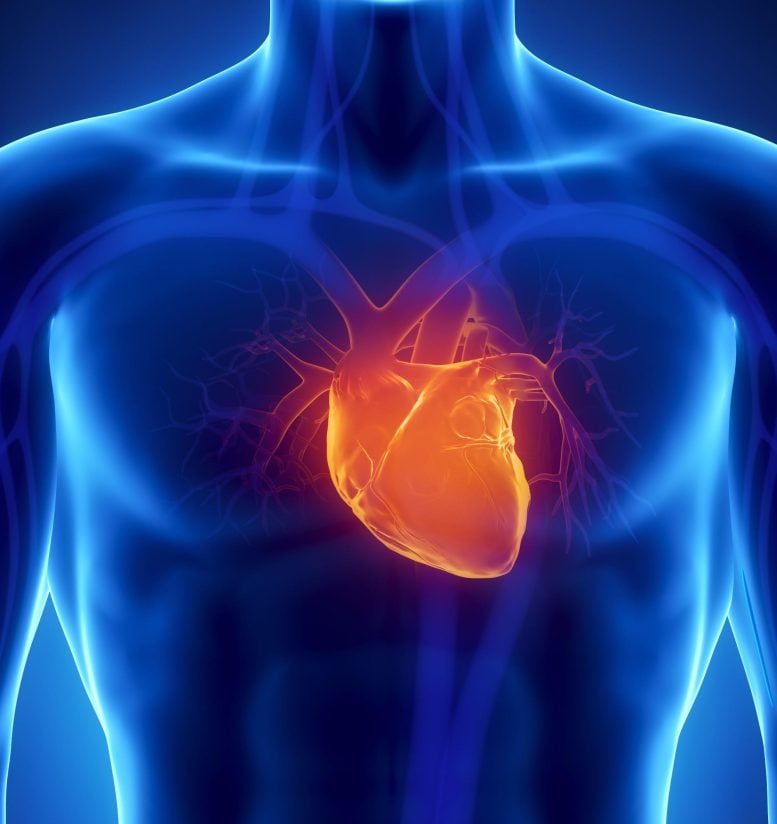
Triglyceride deposit cardiomyovasculopathy is a heart and blood vessel condition where plaque builds up in the arteries due to high levels of triglycerides in the blood. This buildup can lead to symptoms such as chest pain and difficulty breathing, and can increase the risk of heart attack or stroke.
Osaka University researchers discover that taking tricaprin regularly in your diet leads to a reduction in coronary artery plaque and an improvement of symptoms for patients with triglyceride deposit cardiomyovasculopathy.
As children, our parents encouraged us to take vitamins for growth and strength. Now, Japanese researchers have found that a specific supplement may even repair a broken heart.
In a study that was recently published in the European Heart Journal, researchers from Osaka University discovered that a dietary supplement can significantly improve heart disease symptoms in a subset of patients.
Coronary artery disease (CAD), which involves narrowing or even closing of the arteries of the heart and often leads to heart attack, is a major cause of death worldwide. Despite the existence of treatments such as cholesterol-lowering drugs and drug-eluting stents—a new stent technology for local drug delivery—death from this condition is still common, and some patients appear to be resistant to treatment.
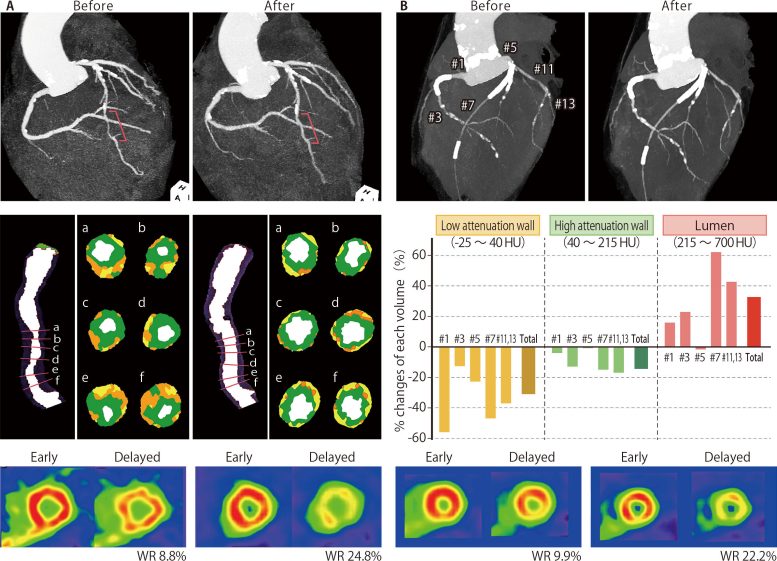
TGCV is an emerging cardiovascular disorder characterized by diffuse narrowing coronary atherosclerosis with triglyceride (TG) deposition caused by defective intracellular lipolysis. TGCV is an often-undiagnosed condition in patients who are resistant to standard therapies. Panels A and B concern two patients in their 60s with refractory angina pectoris and diabetes mellitus. After being diagnosed with TGCV, they started dietary intake of tricaprin. Their symptoms improved within a couple of months. Follow-up coronary computed tomography angiography showed marked regression of atherosclerotic lesions with luminal dilatation (left coronary artery shown as red line in upper panel A; right and left coronary arteries in upper panel B). The low-attenuation area observed from the adventitial side (yellow and orange area, in the middle, panel A) and its volume (yellow bars in the middle, panel B) were reduced, indicating ameliorated lipid involvement. These observations were associated with increased myocardial lipolysis on iodine-123-β-methyl-p-iodophenylpentadecanoic acid scintigraphy (lower panels). Credit: 2022, Ken-ichi Hirano, Remarkable regression of diffuse coronary atherosclerosis in patients with triglyceride deposit cardiomyovasculopathy., European Heart Journal
“Almost 15 years ago we identified a new type of CAD called triglyceride deposit cardiomyovasculopathy (TGCV), in which the coronary arteries are occluded by triglyceride deposits generated by defective intracellular breakdown of triglycerides in vascular smooth muscle cells,” says lead author of the study Ken-ichi Hirano. “This mechanism makes TGCV distinct from classic cholesterol-induced atherosclerosis, and accounts for patients who are resistant to standard remedies for CAD.”
The researchers had developed diagnostic criteria for TGCV, and showed that this condition is especially prevalent in patients with diabetes mellitus and those who have undergone hemodialysis. Despite the ability to diagnose this condition, however, an effective treatment for these patients remained elusive.
“Now we report a remarkable regression of diffuse coronary atherosclerosis in two patients with TGCV,” states Ken-ichi Hirano. “Both had suffered from refractory chest pain and diabetes until diagnosis with TGCV, and subsequent dietary intake of tricaprin led to symptom relief.”
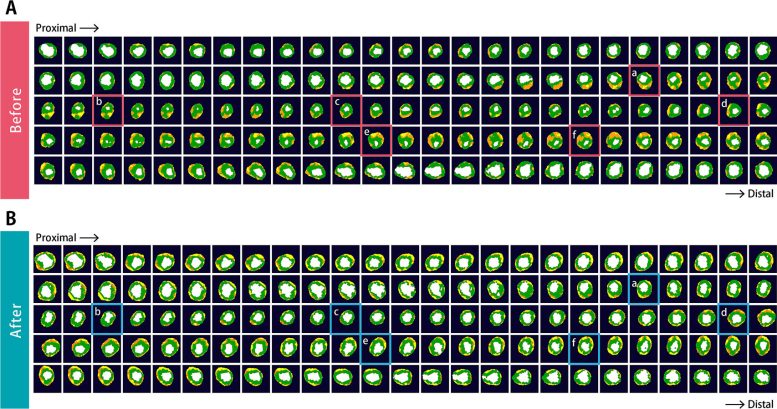
Coronary CT images with a color-coded display for case 1 (panel A) Color-coded short-axis CT images before (A) and after (on-treatment) (B) tricaprin treatment. The short-axis images of the left coronary anterior descending artery are shown at every 0.2 mm: a, b, c, d, e, and f correspond to cross-sectional images of the second image. Credit: 2022, Ken-ichi Hirano, Remarkable regression of diffuse coronary atherosclerosis in patients with triglyceride deposit cardiomyovasculopathy., European Heart Journal
Tricaprin is a commercially available food supplement that promotes lipid breakdown by heart muscle cells. In addition to relieving these patients’ troublesome and painful symptoms, tricaprin also resulted in remarkable regression of the triglyceride build-up in the blood vessels of the heart.
“While atherosclerosis regression following decreased serum lipid levels is well-described, this is the first report of regression due to increased triglyceride lipolysis within cells, and as such is a conceptually novel treatment for coronary atherosclerosis,” says Ken-ichi Hirano.
Given that not all patients respond to current treatments for CAD, the findings from this study pave the way toward establishing a multi-faceted approach to CAD treatment. The dramatic results achieved by administering a readily available dietary supplement hold promise for patients who would otherwise continue to suffer the debilitating effects of this disease.
Reference: “Remarkable regression of diffuse coronary atherosclerosis in patients with triglyceride deposit cardiomyovasculopathy” by Ken-ichi Hirano, Masahiro Higashi and Kenichi Nakajima, 30 December 2022, European Heart Journal.
DOI: 10.1093/eurheartj/ehac762
The study was funded by the Ministry of Health, Labour, and Welfare of Japan, and Nihon Medi-physics Co., Ltd.


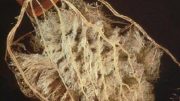
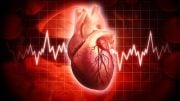
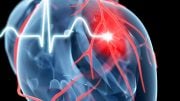
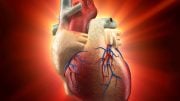

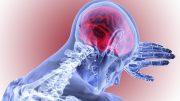
I’m intrigued by this new Tricaprin drug that breaks down cholesterol. Can one take it even when having no diagnosis?
so this is food natural substance ? where can you get it? and what’s ingredients in it.
I am very interested!
Please send me more info and the name of the drug ,and where to get it.
N=2? wtf
Great news about our bodies!
The actual nutraceutical was not named. Would you be so kind as to only list thecarticsl but the active ingredient as well.This journal is not really available!!?
I don’t think caprylic acid (the above mentioned “Caprin”) is the same thing as tricaprin at all. Be careful what you’re ingesting. Tricaprin is found in milkfat (i.e. Heavy/Whipping cream in coffee might be good for you and low carb to boot!) as well as coconut oil. I’d suggest using heavy cream in tea or coffee instead of milk. It’s a far more natural way to get tricaprin in your diet. If you like coconut butter or oil, it might be a good source as well.
Thank you.
Outrageously incomplete article. What is the make-up of & availability of tricaprin?
Seriously sensitive to many foods , drugs and external irritants , I would be very interested in trying this trimaran. I have very unstable angina and cannot take any normal prescription drugs to help . I needca comprehensive breakdown of ingredients
It could help you to sail smoothly and swiftly through troubled waters.
And will keep you on an even keel!
I can not find any retailers offering Tricaprin anywhere? how is this widely available?
The article is available open access at the link and lists the vendor and as-bought labeling of tricaprin. There are also articles with n>>2 contemporary (but also good going Japan!)
It’s commonly tridecanoic acid bc. it’s apparently this saturated fat but only 10 units long (x3) and not even phosphated on the ends…or 30 odd other names, just search for an “alternate chemical names index” or search and make use of that site. A trick of unclogging undoubtedly helped by a little exercise, but see the article.
Nice article regarding cvd how this tricaprin works on diseased vessels.
Why would you write and present an article like this, and not give information on how to find and buy tricaprin?
I wholeheartedly agree with you ❗
Sorry for my previous comment. I just googled and found many sources for getting Tricaprin. Thank you for the article.
I would research the effects of the chlosterol lower effects of Soy lecithin (a natural fat emulsifier to lower cholesterol.easily obtainable from heath food store.i would make sure you get organic soy lecithin if concerned about Genetic modified grain products.its available as a supplement or in granules that have a rather nutty pleasant taste that is good sprinkled on oatmeal or yogurt and may also benefit those with memory issues as it prevents plaque build up in brain which leads to Alzheimer’s from what I’ve read on the benefits of Lecithin.hope this helps someone…
Jean I appreciate your detailed comment. I was wondering if Organic Soy Lecithin would work on emulsifying already deposited plaque or it just prevents deposition or breaks down new plaque. Just curious and you do know so much.
Jean Hastings, soy products are not healthy especially for women
I really enjoyed reading this article
Guys, they are talking about C10, aka decanoic acid, which is what MCT OIL contains.
More info please
You can highlight any word in an article and Google will immediately bring up a ton of info on the chosen word.
Great article!
Please send info of Tricaprin and good source and if it’s available in NZ
Would like to find out more about this supplement
Misleading title. Makes it seem like we’re about to learn about takutsubo cardiomyopathy.
It’s unfortunate they didn’t compare it with Aged garlic Extract which has also shown reversing atherosclerosis is it better to combine the 2? There have been some other supplements Tocotrienols Gilsodin that have also helped
Try sodium thiosulfate also – it’s a calcium & heavy metal chelator. Cardiac blockages are a combination of lipids & calcium.
Another more easily available lipid remover is the amino acid Carnitine